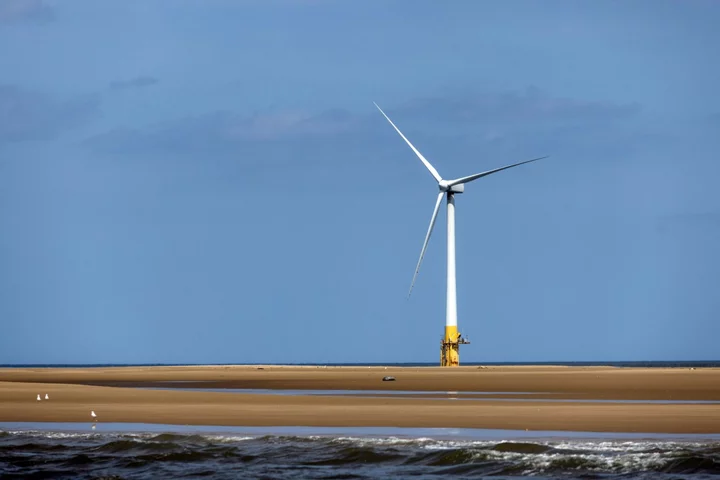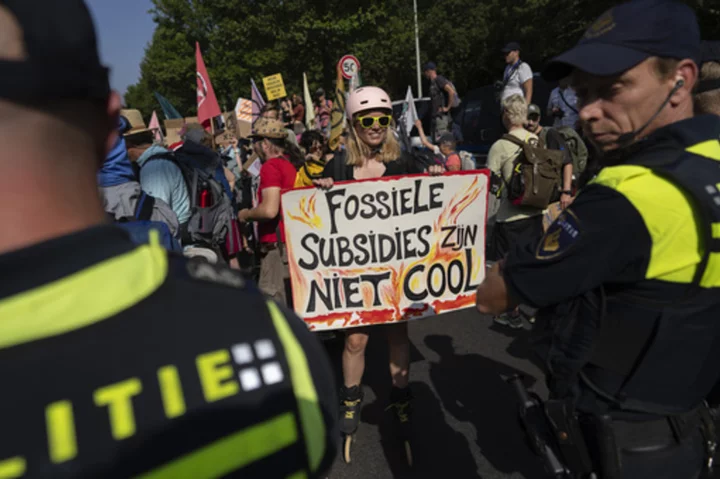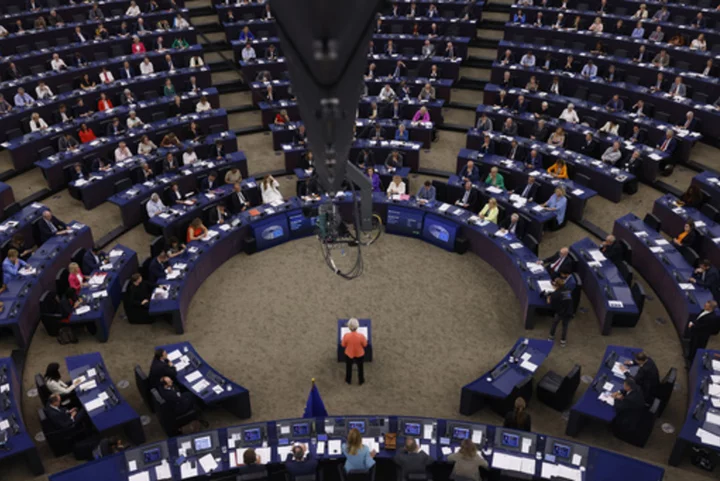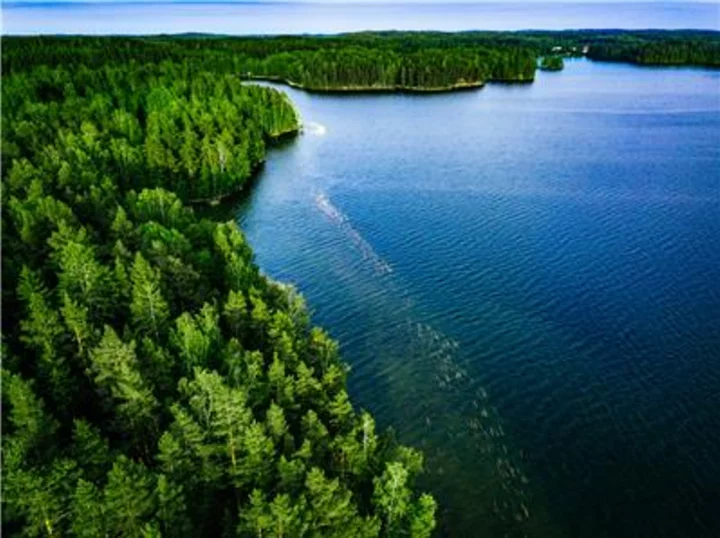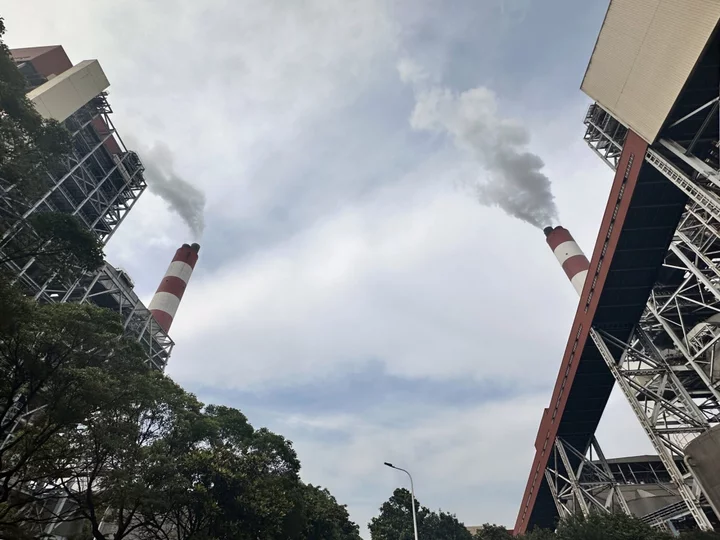Sign up for the New Economy Daily newsletter, follow us @economics and subscribe to our podcast.
In 2019, in the midst of bad-tempered parliamentary battles to shape the terms of Britain’s exit from the EU, the UK became the first country to legislate for net zero by 2050. The law passed without a single vote against.
The unity hasn’t lasted. The target remains in place, but Prime Minister Rishi Sunak sees climate as a profitable political battle field in the run-up to an election polls show he’s likely to lose. His government has opposed the expansion of a low-pollution zone in Labour-controlled London and issued 100 new oil and gas exploration licenses, something opposition leader Keir Starmer has promised to halt.
Egged on by right-wing newspapers, some of his Conservative Party MPs want to go further — backtracking on the plan to phase out new internal-combustion cars in 2030, for example. They argue cutting emissions is an expense cash-strapped Britons can’t afford: the highest inflation rate in Europe means rising utility bills and food prices leave little for expensive electric vehicles or replacing gas boilers with heat pumps. There have even been calls for a referendum on the whole idea of net zero.
“We are governed by consent and the costs of net zero are risking that consent,” said Jacob Rees-Mogg, Conservative MP and former energy secretary, who’s a standard bearer for the right of the party. “There was consent when economies were going nicely. There’s much less consent when economies are suffering from inflation.”
The fraying climate consensus isn’t unique to Britain. In June, 13,000 people gatheredin a south German town in June to protest against a law to ban gas boilers, an issue that’s rocked Olaf Scholz’s coalition, where the Green party is a partner.
Parts of the EU’s so-called Green Deal have opposition from member states, notably France, which opposed stricter exhaust emissions rules, and Germany, which almost stopped a ban on combustion engines. Other leaders like Belgium’s Prime Minister Alexander De Croo have urged caution over the impact that the fast pace of policies to reduce carbon emissions will have on industry. Dutch politics has been shaken by opposition to plans to curb emissions from its farms.
Polls show most European voters want action on climate change as heat waves, wild fires and floods make the impact of emissions ever clearer — but they’re reluctant to bear the cost of switching to less-polluting technology. For governments that means grappling with achieving long-term green targets, while not over-burdening companies and individuals with up-front costs as inflation continues to burn through people’s wallets.
“The error that has been made in several countries is to forget that it’s a very big transformation that you have to do, and you can only succeed doing it if you do it in a socially just manner,” said Niklas Höhne, a professor in climate policy at Germany’s Wageningen University and co-founder of the NewClimate Institute.
In Germany, the government wants to set aside an off-budget €212 billion ($230 billion) fund to help finance the green push, but it is unwilling to implement measures that would affect voters’ homes and habits. The country is reluctant to cut down on its €65 billion of environmentally harmful subsidies, which help the nation’s automakers as they include commuter tax refunds and tax cuts on diesel or company fleets. There is also resistance within the coalition to implementing the EU’s stricter energy efficiency rules, which will require many house owners to invest heavily in renovation.
Germany has now watered down its ban on new fossil-fuel heating systems, which could have made a significant contribution to cutting emissions in the housing sector. The government also rolled back its district heating goals after heavy lobbying from utilities.
“We have seen this for years, when an economic crisis comes, climate protection is the first thing to be questioned,” said Susanne Dröge, who heads the climate protection and energy department in Germany’s Federal Environmental Agency.
Back in the UK, there are more decisions to come that will show how afar politicians are willing to row back on climate goals. Sunak this week watered-down a de facto ban on the development of new onshore wind farms, but was criticized by clean energy campaigners for not going far enough, with local consent still required.
This week, a UK government auction for offshore wind failed to attract any bids, throwing fresh doubt on the country’s ability to meet its net zero goal.
His new Energy Secretary Claire Coutinho will also have to decide whether to approve a controversial new oil field off the Shetland Islands, Rosebank, and if she wants to push-ahead with plans for the opening of a new coal mine in Cumbria, despite ongoing legal challenges and protests. The government approved plans for what will be the first major coal mine in decades late last year.
After Sunak clung on to a parliamentary seat he’d been predicted to lose in July, as he fell 20 points behind the opposition Labour Party in national polls, his aides now believe creating a firm dividing line over green policy, emphasizing the upfront cost of green investment, is the way to win.
The government is “trying to make it into a wedge issue between themselves and Labour,” said Jess Ralston, head of energy at the Energy and Climate Intelligence Unit, a UK-based nonprofit. “The world has been more focused on energy in the last few months than ever before.”
The lack of familiarity with climate policies isn’t helping, Ralston says. According to polling by the ECIU, 97% of Brits don’t know when the target gas boiler phase out will begin and 74% believe the phase-out of petrol-fueled cars is due to happen sooner than is the case. Half of people also don’t realize that gas boilers produce carbon emissions.
Labour strategists worry Sunak will call a general election in May next year, to coincide with London’s mayoral election, where Khan has faced a backlash for expanding the charging zone for the most polluting cars to the suburbs with short notice. Labour aides believe if Sunak chooses to do this, green issues will become one of the main political footballs they want to fight over.
But Labour says its central green policy — a plan to spend billions to publicly fund renewable energy infrastructure projects alongside private firms — is centered around economic growth, investment and job opportunity throughout the country.
They look to President Joe Biden’s Inflation Reduction Act, which earmarks billion for job-creating climate investment, for inspiration on what electorally successful green policy could be.
And it’s not all one-way tracking inside Sunak’s party. Some point to a recent decision by Tata Group to bring a £4 billion electric car battery plant to the UK over European rivals that was partly driven by a policy banning sales of new petrol and diesel cars from 2030.
“Not only is it deeply patronizing to my voters to pretend they don’t care about the environment, net zero is basically underpinning every job on Teesside over the decades to come,” said Conservative MP and former minister Simon Clarke in a post on Twitter last week. “It’s economically and environmentally vital we deliver.”
Author: Ellen Milligan, Olivia Rudgard and Petra Sorge

